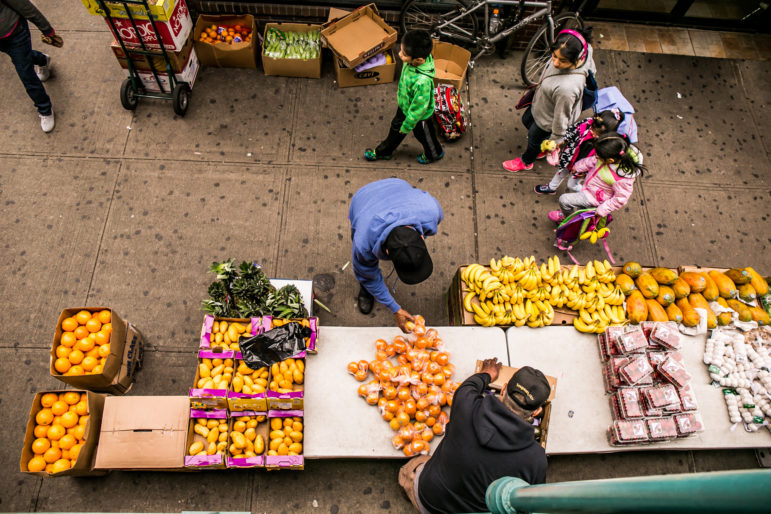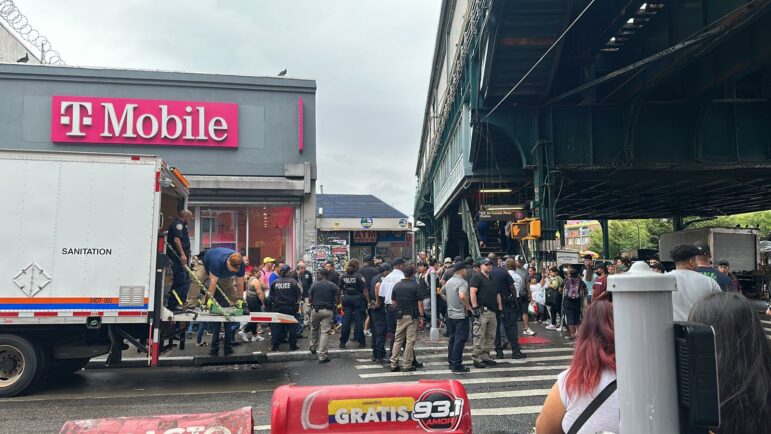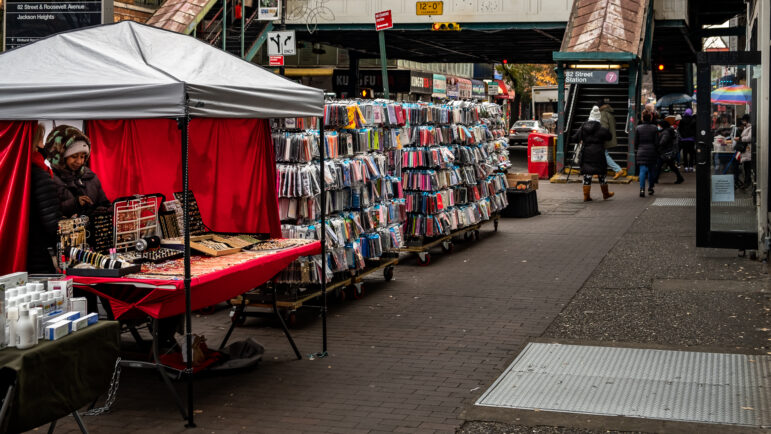Since Sanitation took the street vending enforcement reins this spring, the department has confiscated abandoned or non-compliant material from street vendors in 228 cases, and has donated 32,220 pounds of food and composted another 3,880 pounds, officials say.

Adi Talwar
A street vendor at the 207 street subway entrance in 2016.Lea la versión en español aquí.
Pilar, a longtime street vendor who sells toys and hats in Jackson Heights, was walking to a dentist appointment with her daughter on Aug. 23 when she saw oranges, apples, tomatoes, grapes, bananas, and tangerines being confiscated by the Department of Sanitation from a street vendor between 96th and 97th streets on Roosevelt Avenue.
Hours later, around 5 p.m., she came across a line of people receiving free food at the corner of 82nd Street, in front of a bank. Pilar, who did not want to use her full name for fear of retaliation, says she saw the same Sanitation truck, but no food was inside: it was placed on plastic folding tables, and workers wearing red vests were handing it out. She believes it was the same food she had seen seized from the vendor earlier that day.
Since April, when the city moved vendor enforcement responsibilities away from the Department of Consumer and Worker Protection (DCWP) to the Department of Sanitation (DSNY), sellers and advocates say things have changed in two main areas: more sweeps and confiscations, and less educational outreach to vendors, many of whom are newcomers who don’t know the peddler rules.
Since Sanitation took the reins in April to Aug. 6, the agency has donated 32,220 pounds of food seized from vendors and composted another 3,880 pounds, according to a spokesperson.
The enforcement shift is the latest in a long dispute over how the city should regulate street vending, a sector largely made up of immigrants, many of whom are unable to sell legally under city rules thanks to a long-standing limit on the number of available permits.
The situation came to a head last month when DSNY and police cleared dozens of vendors from Corona Plaza—a busy hub at Roosevelt Avenue and National Street that’s gained popularity since the pandemic as a foodie destination—in response to what officials said were complaints about cleanliness and crowding there.
For years, in neighborhoods across the city, tensions have simmered between vendors and brick-and-mortar business owners, who cite increased competition from street sellers.
The vendors who used to fill Corona Plaza began to organize before the pandemic and have since formed the Street Vendor Association at Corona Plaza, the city’s first local vendor association.
Prior to the incident, the group was in talks with various city agencies and departments, especially the Department of Transportation, which has jurisdiction over the plaza, in the hopes of formalizing their use of the space without having to get a vending permit, as has been allowed in other places such as Bronx Night Market in Fordham Plaza.
In the meantime, “People are stuck in a really awful situation, and some vendors are taking loans,” said Carina Kaufman-Gutierrez, deputy director of the Street Vendor Project, of those who’ve been unable to sell in the plaza in the four weeks since the sweep.

Obtained by City Limits
Sanitation police confiscating food on Aug. 25 at Roosevelt and National Street.Confiscations
Between April and Aug. 6—a period that includes the Corona Plaza sweep—Sanitation made 228 confiscations of abandoned or non-compliant material from city street vendors, the equivalent of almost two confiscations a day, according to the agency.
Prior to the change in enforcement, DCWP did not confiscate property, but carried out “joint enforcement and confiscations with NYPD,” DCWP spokesperson Michael Lanza told City Limits. “DCWP partnered with NYPD because DCWP does not have the authority to compel vendors to provide ID or to confiscate items from general vendors like NYPD can,” Lanza added.
When asked for figures on confiscations prior to the DSNY shift, for comparison, DCWP referred City Limits to the NYPD. A police spokesperson said they could not provide the numbers because NYPD data “is not tracked to that level of specificity.”
“When an item is confiscated,” explained Sanitation Department Spokesperson Vincent Gragnani, “due to repeated non-compliance or because it was found abandoned, it is vouchered and taken to a DSNY facility where it can later be claimed.”
But when it comes to food, the process is different, and there are no items returned to the vendor. Food is either donated to food pantries—when a New York City Department of Health and Mental Hygiene (DOHMH) inspector deems it safe to do so—or composted.
The Department of Sanitation explained that members of their police force, which carries out the sweeps, “have unique experience at the intersection of quality of life and cleanliness, and a long track record of balancing the needs of businesses and residents,” Gragnani said.
Their enforcement focus, he added, has been on compliance around “core quality of life concerns”—like proper disposal of waste and passable sidewalks—“the rules that make a difference in the day to day pedestrian experience of our City, and that keep vendors safe.”
Between April and Aug. 6, Sanitation doled out 324 tickets to street vendors, less than the 534 tickets given out by DCWP during the second quarter of 2022.
But police are still issuing more tickets to vendors than any other agency, despite a de Blasio-era pledge to shift them away from enforcement, a trend that City Limits also noted in 2022. Between January and June, the police issued 1,242 tickets, according to the police department’s quarterly reports (not including civilian summonses issued during the second quarter of 2023, which have not yet been published).
“We are not selling freely, without paying taxes,” said Pilar pointing out that like any small business, vendors take courses, follow rules, and file their taxes.
It was hard for Pilar to know if the free produce she received that afternoon was the same as what had been confiscated from the street vendor she saw earlier that day. So she contacted the vendor, showed him pictures, and he told her those were his products. (When asked, a DSNY spokesperson did not comment directly on the incidents, but reiterated the agency’s policy of donating or composting seized food.)
The vendor from whom the items were seized did not want to be identified. He said he paid $1,000 to get back his pushcart; it was not immediately clear what violation or violations he received.
Pilar, who has been vending in Queens for more than 20 years, recalled earlier eras when street vendors were severely penalized, and said the difference now is that police no longer arrest vendors.
“I have been arrested four times [for selling on the streets],” said Pilar about the era under former Mayor Michael Bloomberg, “when things were tough.”

Adi Talwar
Street vendors near the 82nd Street subway station in Jackson Heights, Queens, in 2022.Less educational outreach
Under city rules, food vendors are required to complete training at the NYC Health Department’s Health Academy to obtain a mobile street vendor license. It’s the first step of a two-part system that also requires a permit, the number of which were capped decades ago, making them difficult to obtain.
Secondhand permits that circulate on a black market can go for tens of thousands of dollars in some instances. Legislation passed by the City Council in 2021, intended to gradually expand the number of permits the city issues each year, has been moving slowly. Out of the 445 new supervisory license applications authorized for fiscal year 2023, the DOHMH has received 104 applications and only four vendors have received a permit, CBS reported early this month.
According to DOHMH, there were 14,981 licensed food vendors in the city as of March 23, leaving almost two-thirds* of vendors without a permit (mobile food permits are capped at just 5,100).
More people have turned to street vending to make a living in recent years, advocates say, due to a number of factors, including economic difficulties worsened by the pandemic, rising rents and cost of living. The arrival of new immigrants in the city over the last year, most of whom aren’t authorized to legally do other types of work, has also added to the growing sector of vendors.
From April through Aug. 18, over 700 people attended the 24 courses that have been conducted for mobile food vendors at the Health Academy, explained DOHMH.
However, with the change from DCWP to Sanitation, there has been less educational outreach on street vending rules, advocates say, impacting first-time peddlers in particular, who are less versed on the complicated policies.
“DCWP used to do outreach education,” Kaufman-Gutierrez explained. “DSNY is only doing enforcement, so there is a huge gap.”
The 2021 legislation that was supposed to expand the number of food vendor licenses also included giving DCWP more civilian oversight of vending.
While DCWP spent the first half of 2021 focused on vendor outreach and education in lieu of giving out most fines, the educational outreach component has virtually disappeared under Sanitation, leaving the full weight of the effort to organizations such as SVP.
“We do not engage in education outside of enforcement,” said the Sanitation Department spokesperson, noting that other organizations like DCWP, DOHMH, and New York City Department of Small Business Services (SBS) do that kind of work.
But City Limits asked these agencies, and found that that earlier level of proactive educational outreach is no longer the norm.
“DCWP no longer oversees vending enforcement or education,” DCWP spokesperson said. The department held the most vending outreach events during 2021, with 60, but that number dropped to six in 2022 and only one event in 2023.
DOHMH explained that there is an education component at every inspection, and pointed to the agency’s website, which also has information and resources about city vending rules.
Since the change of agencies in the enforcement process in April, SBS conducted three street vendor-specific educational outreach events in conjunction with the Street Vendors Project in the neighborhoods of Fordham Road, Harlem, and Sunset Park in June, and is mailing information about rules compliance and how to get support, in 12 languages, to 22,000 street vendors, based on information previously provided by DOHMH.
On Sept. 28, SBS will host a free webinar for street vendors to help them understand the application and permitting process, with DOHMH and the Parks Department.
*Editor’s note: This figure has been updated since original publication; it is roughly two-thirds of food vendors who don’t have a permit, not a third, as previously stated.
To reach the reporter behind this story, contact Daniel@citylimits.org. To reach the editor, email Jeanmarie@citylimits.org.








